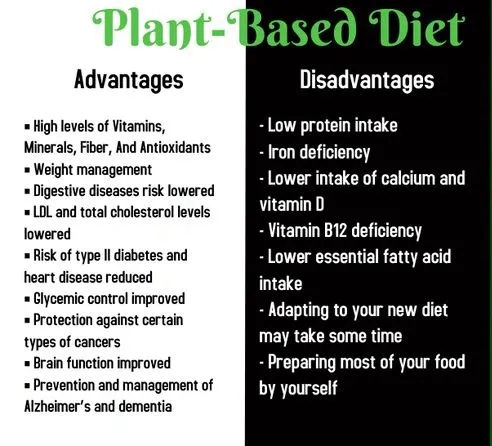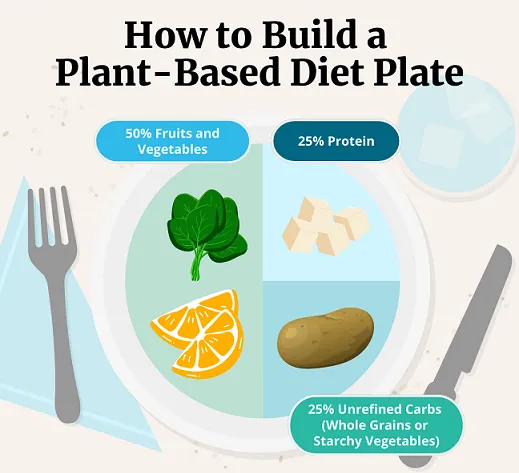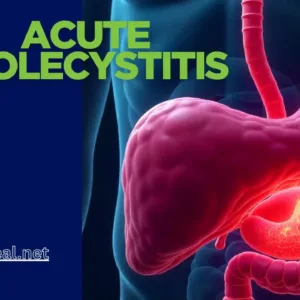Plant-based diets have gained significant popularity in recent years, with many people adopting them for health, environmental, and ethical reasons. But are they truly beneficial for long-term health? In this blog, we’ll explore the pros and cons of plant-based diets, backed by research, to help you make an informed decision.
What is a Plant-Based Diet?
A plant-based diet focuses on consuming foods primarily derived from plants, including fruits, vegetables, nuts, seeds, oils, whole grains, legumes, and beans. It can range from fully vegan (no animal products) to flexitarian (mostly plant-based with occasional animal products).
Pros of Plant-Based Diets for Long-Term Health
Plant-based diets have gained widespread attention for their potential to improve health and prevent chronic diseases. By focusing on whole, minimally processed plant foods, individuals can reap numerous long-term health benefits. Below, we dive deep into the key advantages of plant-based diets for long-term health, supported by research and expert insights.
1. Improved Heart Health
Plant-based diets are naturally low in saturated fats and cholesterol, which are commonly found in animal products. Instead, they are rich in heart-healthy nutrients like fiber, antioxidants, and unsaturated fats.
- Lower Cholesterol Levels: Studies have shown that plant-based diets can reduce LDL (bad) cholesterol levels, a major risk factor for heart disease. According to the American Heart Association, diets high in fruits, vegetables, and whole grains are associated with a lower risk of cardiovascular diseases.
- Reduced Blood Pressure: The high potassium content in plant foods helps regulate blood pressure, further protecting heart health.
2. Weight Management and Obesity Prevention
Plant-based diets are typically lower in calories and higher in fiber, making them effective for weight management.
- High Fiber Content: Fiber-rich foods like vegetables, fruits, and whole grains promote satiety, helping you feel full for longer and reducing overeating.
- Lower Caloric Density: Plant-based foods are less calorie-dense than animal products, allowing you to eat larger portions without consuming excess calories.
- Research-Backed Benefits: A study published by the National Institutes of Health (NIH) found that individuals following plant-based diets tend to have lower body mass indexes (BMIs) and reduced rates of obesity.
3. Reduced Risk of Chronic Diseases
A well-planned plant-based diet can significantly lower the risk of several chronic diseases, including type 2 diabetes, hypertension, and certain cancers.
- Type 2 Diabetes Prevention: Plant-based diets improve insulin sensitivity and reduce the risk of developing type 2 diabetes. The American Diabetes Association highlights that diets rich in whole grains, legumes, and vegetables can help manage blood sugar levels.
- Cancer Risk Reduction: The high antioxidant content in plant foods helps combat oxidative stress and inflammation, which are linked to cancer development. The World Cancer Research Fund recommends a diet rich in fruits, vegetables, and whole grains to reduce cancer risk.
4. Better Gut Health
Plant-based diets are abundant in dietary fiber, which is essential for maintaining a healthy gut microbiome.
- Improved Digestion: Fiber promotes regular bowel movements and prevents constipation.
- Healthy Gut Microbiome: A diverse gut microbiome is linked to improved immunity, mental health, and reduced inflammation. According to Harvard Medical School, a diet rich in plant-based foods supports the growth of beneficial gut bacteria.
5. Enhanced Longevity
Research suggests that plant-based diets may contribute to a longer lifespan by reducing the risk of chronic diseases and promoting overall health.
- Lower Mortality Rates: A study published in the Journal of the American Medical Association (JAMA) found that individuals following plant-based diets had lower mortality rates compared to those consuming more animal products.
- Anti-Aging Benefits: The antioxidants in plant foods help combat oxidative stress, a key factor in aging.
6. Environmental and Ethical Benefits
While not directly a health benefit, the environmental impact of plant-based diets contributes to long-term planetary health, which indirectly supports human health.
- Reduced Carbon Footprint: Plant-based diets require fewer natural resources and produce fewer greenhouse gas emissions compared to animal-based diets.
- Sustainable Food Choices: By choosing plant-based options, individuals can support sustainable agriculture and reduce deforestation.
7. Improved Mental Health
Emerging research suggests that plant-based diets may have a positive impact on mental health.
- Rich in Mood-Boosting Nutrients: Plant foods are high in folate, magnesium, and omega-3 fatty acids, which are linked to reduced symptoms of depression and anxiety.
- Inflammation Reduction: Chronic inflammation is associated with mental health disorders, and the anti-inflammatory properties of plant-based diets can help mitigate this.
Cons of Plant-Based Diets for Long-Term Health
While plant-based diets offer numerous health benefits, they are not without potential drawbacks. If not carefully planned, a plant-based diet can lead to nutrient deficiencies and other health challenges. Below, we explore the key disadvantages of plant-based diets for long-term health, supported by research and expert insights.
1. Risk of Nutrient Deficiencies
One of the most significant concerns with plant-based diets is the potential for nutrient deficiencies, as some essential nutrients are primarily found in animal products.
- Vitamin B12 Deficiency: Vitamin B12 is crucial for nerve function and red blood cell production. It is naturally found only in animal products. Deficiency can lead to anemia, fatigue, and neurological issues. According to the National Institutes of Health (NIH), vegans and vegetarians are at higher risk and should consider fortified foods or supplements.
- Iron Deficiency: Plant-based iron (non-heme iron) is less easily absorbed than iron from animal sources (heme iron). This can increase the risk of iron-deficiency anemia, especially in women of childbearing age. The Academy of Nutrition and Dietetics recommends pairing iron-rich plant foods with vitamin C to enhance absorption.
- Calcium and Vitamin D: These nutrients are essential for bone health. While fortified plant milks and leafy greens provide calcium, vitamin D is primarily obtained from sunlight and fortified foods. A deficiency can lead to osteoporosis.
- Omega-3 Fatty Acids: Plant-based sources of omega-3s (like flaxseeds and walnuts) provide ALA, which the body must convert to EPA and DHA. This conversion is inefficient, potentially leading to deficiencies. The American Heart Association suggests algae-based supplements for vegans.
- Zinc: Plant-based zinc sources (like beans and nuts) are less bioavailable than animal sources. Zinc deficiency can impair immune function and wound healing.
2. Potential for Over-Reliance on Processed Foods
Not all plant-based diets are created equal. Relying on processed vegan foods can negate the health benefits of a plant-based diet.
- High in Sugar and Salt: Many vegan alternatives, such as plant-based meats, cheeses, and desserts, are highly processed and may contain added sugars, sodium, and unhealthy fats.
- Low in Nutrients: Processed vegan foods often lack the vitamins, minerals, and fiber found in whole plant foods. Overconsumption can lead to poor nutrition and weight gain.
3. Difficulty Meeting Protein Needs
While plant-based diets can provide adequate protein, it requires careful planning to ensure all essential amino acids are consumed.
- Incomplete Proteins: Most plant proteins (except quinoa and soy) are incomplete, meaning they lack one or more essential amino acids. Combining different plant proteins (e.g., beans and rice) is necessary to meet protein needs.
- Higher Protein Requirements for Athletes: Individuals with higher protein needs, such as athletes or bodybuilders, may find it challenging to meet their requirements solely through plant-based sources.
4. Potential for Overeating Carbohydrates
Plant-based diets can be high in carbohydrates, which may not suit everyone’s health goals.
- Blood Sugar Spikes: Diets high in refined carbs (e.g., white bread, pasta, and sugary snacks) can lead to blood sugar imbalances, increasing the risk of type 2 diabetes.
- Weight Gain: Overconsumption of calorie-dense plant foods like nuts, seeds, and oils can lead to weight gain if portion sizes are not controlled.
5. Social and Practical Challenges
Adopting a plant-based diet can present social and logistical challenges, especially in certain environments.
- Limited Options in Social Settings: Dining out or attending social events can be difficult, as plant-based options may be limited.
- Time-Consuming Meal Prep: Plant-based diets often require more meal planning and preparation to ensure balanced nutrition.
- Accessibility Issues: In areas with limited access to fresh produce or specialty vegan products, maintaining a plant-based diet can be challenging.
6. Potential for Digestive Issues
While fiber is beneficial for gut health, a sudden increase in fiber intake can cause digestive discomfort.
- Bloating and Gas: High-fiber foods like beans, lentils, and cruciferous vegetables can cause bloating and gas, especially if introduced too quickly.
- Nutrient Absorption Interference: Excessive fiber can interfere with the absorption of certain minerals, such as iron and zinc.
7. Risk of Orthorexia or Unhealthy Obsession
For some individuals, the focus on a “perfect” plant-based diet can lead to orthorexia, an unhealthy obsession with healthy eating.
- Psychological Stress: Strict dietary restrictions can cause anxiety and social isolation.
- Nutritional Imbalance: Overemphasis on “clean eating” may lead to the exclusion of essential food groups, resulting in nutrient deficiencies.

Professional Tips for a Balanced Plant-Based Diet
Adopting a plant-based diet can be incredibly beneficial for your health, but it requires careful planning to ensure you meet all your nutritional needs. Below are professional tips to help you maintain a balanced, nutrient-rich plant-based diet for long-term health and wellness.
1. Diversify Your Plate
A varied diet ensures you get a wide range of nutrients. Include a mix of:
- Fruits and Vegetables: Aim for a rainbow of colors to get different vitamins, minerals, and antioxidants.
- Whole Grains: Brown rice, quinoa, oats, barley, and whole wheat provide fiber, B vitamins, and energy.
- Legumes: Beans, lentils, chickpeas, and peas are excellent sources of protein, iron, and fiber.
- Nuts and Seeds: Almonds, walnuts, chia seeds, and flaxseeds offer healthy fats, protein, and essential minerals.
2. Ensure Adequate Protein Intake
Protein is essential for muscle repair, immune function, and overall health. To meet your protein needs:
- Combine Complementary Proteins: Pair foods like beans and rice or hummus and whole-grain pita to get all essential amino acids.
- Include High-Protein Plant Foods: Tofu, tempeh, edamame, seitan, and lentils are excellent protein sources.
- Consider Protein-Rich Grains: Quinoa and amaranth are complete proteins, meaning they contain all nine essential amino acids.
3. Supplement Key Nutrients
Some nutrients are harder to obtain from plant-based sources. Consider these supplements:
- Vitamin B12: Essential for nerve function and red blood cell production. Take a B12 supplement or consume fortified foods like plant-based milks and cereals.
- Vitamin D: Especially important in winter or if you have limited sun exposure. Opt for fortified foods or a vitamin D2/D3 supplement.
- Omega-3 Fatty Acids: Algae-based supplements provide EPA and DHA, which are crucial for brain and heart health.
- Iron and Zinc: If you’re at risk of deficiency, consider supplements or focus on iron-rich plant foods like spinach, lentils, and pumpkin seeds, paired with vitamin C to enhance absorption.
4. Focus on Iron Absorption
Plant-based iron (non-heme iron) is less bioavailable than iron from animal sources. To improve absorption:
- Pair Iron-Rich Foods with Vitamin C: Add citrus fruits, tomatoes, or bell peppers to meals containing spinach, lentils, or beans.
- Avoid Inhibitors: Tea, coffee, and calcium supplements can inhibit iron absorption. Consume them between meals rather than with iron-rich foods.
5. Incorporate Healthy Fats
Healthy fats are essential for brain health, hormone production, and nutrient absorption. Include:
- Nuts and Seeds: Almonds, walnuts, chia seeds, and flaxseeds.
- Avocados: Rich in monounsaturated fats and potassium.
- Plant Oils: Use olive oil, avocado oil, or flaxseed oil in moderation.
6. Limit Processed Foods
While convenient, processed vegan foods (e.g., vegan burgers, fries, and desserts) can be high in sugar, salt, and unhealthy fats. Instead:
- Choose Whole Foods: Opt for minimally processed options like whole grains, fresh fruits, and vegetables.
- Read Labels: Check for added sugars, sodium, and artificial ingredients in packaged foods.
7. Monitor Calcium Intake
Calcium is vital for bone health. Ensure you’re getting enough by:
- Including Calcium-Rich Foods: Fortified plant milks, tofu made with calcium sulfate, leafy greens (kale, bok choy), and almonds.
- Considering Supplements: If your diet falls short, consult a healthcare provider about calcium supplements.
8. Stay Hydrated
Fiber-rich plant-based diets require adequate hydration to support digestion.
- Drink Plenty of Water: Aim for at least 8 glasses a day.
- Include Herbal Teas and Broths: These can contribute to your daily fluid intake.
9. Plan Your Meals
Meal planning ensures you meet your nutritional needs and avoids last-minute unhealthy choices.
- Prep in Advance: Cook batches of grains, beans, and vegetables for easy meals throughout the week.
- Balance Macronutrients: Ensure each meal includes protein, healthy fats, and complex carbs.
10. Consult a Registered Dietitian
A dietitian can help you create a personalized plan to meet your nutritional needs.
- Address Deficiencies: They can identify potential gaps in your diet and recommend solutions.
- Tailor to Your Lifestyle: Whether you’re an athlete, pregnant, or managing a health condition, a dietitian can provide tailored advice.
11. Be Mindful of Portion Sizes
Even healthy plant-based foods can contribute to weight gain if consumed in excess.
- Watch Calorie-Dense Foods: Nuts, seeds, and oils are nutritious but high in calories. Stick to recommended serving sizes.
- Practice Portion Control: Use smaller plates and listen to your hunger cues.
12. Educate Yourself
Stay informed about plant-based nutrition to make the best choices for your health.
- Read Reliable Sources: Trusted organizations like the Academy of Nutrition and Dietetics and Harvard T.H. Chan School of Public Health offer evidence-based guidance.
- Experiment with Recipes: Try new plant-based recipes to keep your diet exciting and varied.

Conclusion: Embracing a Plant-Based Diet for Long-Term Health
A plant-based diet offers a wealth of benefits, from improved heart health and weight management to a reduced risk of chronic diseases and a smaller environmental footprint. However, like any dietary approach, it requires careful planning to ensure all nutritional needs are met. By focusing on whole, minimally processed foods, supplementing key nutrients, and consulting with healthcare professionals, you can enjoy the long-term health advantages of a plant-based lifestyle while minimizing potential drawbacks.
Whether you’re transitioning to a fully plant-based diet or simply incorporating more plant-based meals into your routine, the key is balance and mindfulness. Diversify your plate, prioritize nutrient-dense foods, and stay informed about your nutritional needs. With the right approach, a plant-based diet can be a sustainable, healthy, and fulfilling way to nourish your body and support the planet.
If you’re considering making the switch, consult a healthcare professional or dietitian to ensure your diet meets all your nutritional needs.
External Resources:
American Heart Association on Plant-Based Diets
By making informed choices and embracing a well-rounded plant-based diet, you can take a proactive step toward better health and a more sustainable future.




